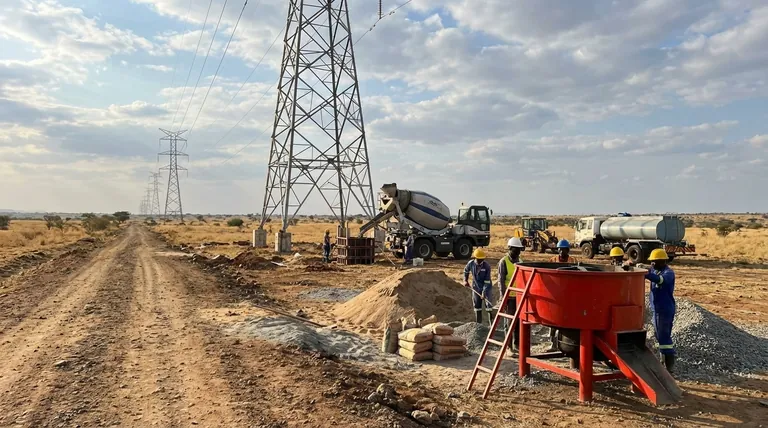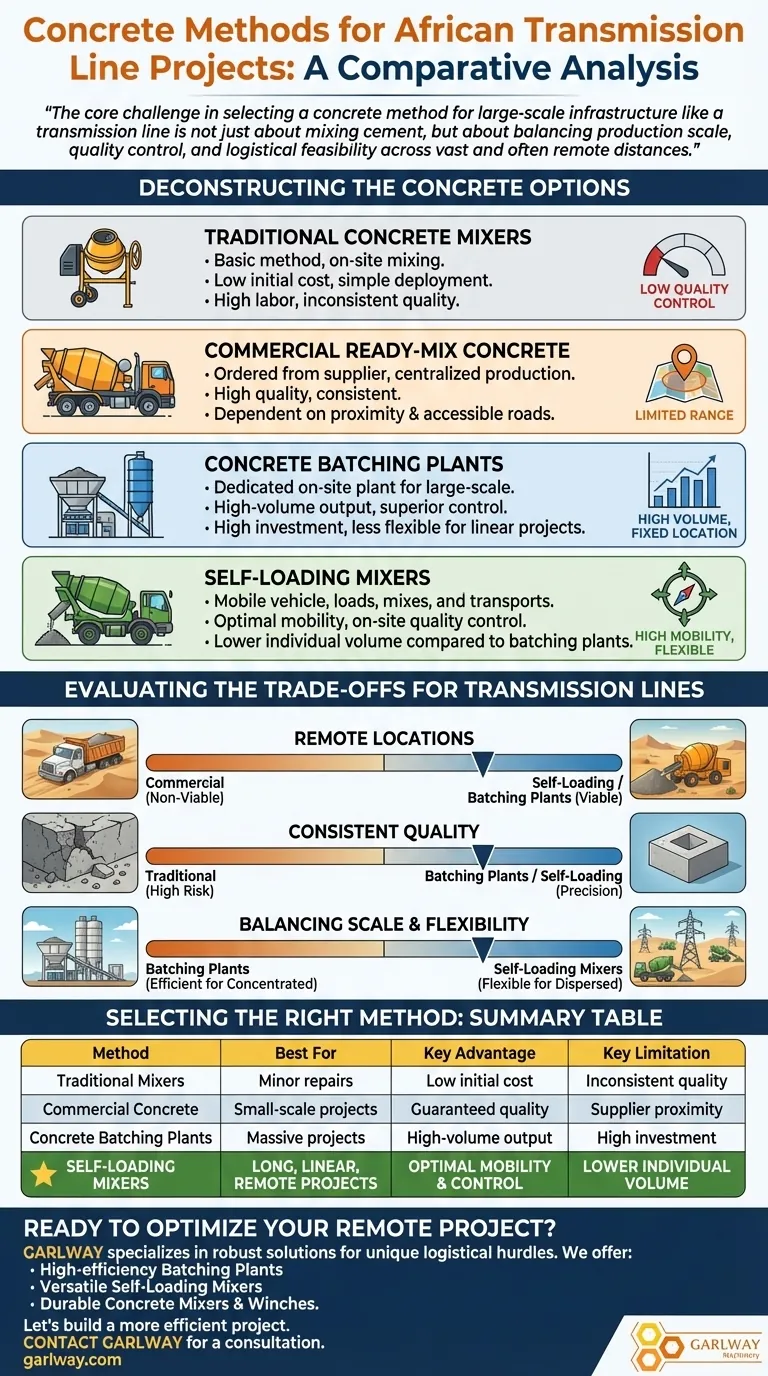For the African transmission line projects, four primary concrete construction methods were considered to address the unique logistical and environmental challenges. These methods were traditional concrete mixers, the use of commercial ready-mix concrete, the setup of dedicated concrete batching plants, and the deployment of self-loading concrete mixers.
The core challenge in selecting a concrete method for large-scale infrastructure like a transmission line is not just about mixing cement, but about balancing production scale, quality control, and logistical feasibility across vast and often remote distances.

Deconstructing the Concrete Options
Each method presents a distinct approach to producing concrete, with significant implications for project timelines, costs, and quality assurance. Understanding these fundamental differences is the first step in making a sound engineering decision.
Traditional Concrete Mixers
This is the most basic method, involving small, portable mixers that combine cement, aggregate, and water on-site. It relies heavily on manual labor for loading materials and managing the mix.
This approach offers the lowest initial capital investment and is simple to deploy.
Commercial Concrete
This method involves ordering ready-mixed concrete from an established commercial supplier. The concrete is produced in a centralized, quality-controlled plant and transported to the construction site in agitator trucks.
It guarantees high-quality, consistent concrete but is entirely dependent on the site's proximity to the supplier and the existence of accessible roads.
Concrete Batching Plants
For large-scale needs, a dedicated batching plant can be built on or near the project site. This plant mechanizes the entire process, measuring materials by weight and ensuring a highly consistent, high-volume output.
This option provides maximum control over supply and quality for major projects but requires a significant upfront investment in equipment and setup.
Self-Loading Mixers
A self-loading mixer is a specialized vehicle that combines the functions of a wheel loader and a traditional mixer. It can load its own raw materials, mix them in its drum, and transport the finished concrete directly to the pour site.
This offers a highly mobile and flexible solution, bridging the gap between small mixers and large, static batching plants.
Evaluating the Trade-offs for Transmission Lines
The linear and remote nature of a transmission line project magnifies the importance of logistical planning. The ideal method must overcome the challenges of distance, terrain, and the need for consistent structural integrity at each tower foundation.
The Challenge of Remote Locations
Commercial concrete is often non-viable for transmission lines that stretch hundreds of kilometers through undeveloped areas. The travel time from a commercial plant can cause the concrete to begin setting before it can be poured.
Self-loading mixers and on-site batching plants are designed specifically to overcome this geographical constraint by bringing production closer to the point of use.
The Need for Consistent Quality
Transmission tower foundations are critical structural elements. Inconsistent concrete quality, a major risk with manually-fed traditional mixers, can lead to foundation failure.
Batching plants and self-loading mixers use computerized systems to weigh materials, providing a level of precision and consistency that is difficult to achieve manually.
Balancing Scale and Flexibility
A central batching plant is highly efficient for a concentrated construction area but becomes a logistical bottleneck when work sites are spread far apart.
A fleet of self-loading mixers, while producing less volume individually, provides immense flexibility. They can operate independently, servicing multiple, dispersed tower locations simultaneously.
Selecting the Right Method for Your Project
The final decision depends entirely on the specific constraints and goals of the infrastructure project.
- If your primary focus is a small-scale, easily accessible project: Commercial concrete provides guaranteed quality with the least operational overhead.
- If your primary focus is a massive, concentrated project like a power station: A dedicated concrete batching plant offers the best economy of scale and quality control.
- If your primary focus is a long, linear project in a remote region: Self-loading mixers deliver the best balance of mobility, quality control, and logistical independence.
- If your primary focus is minor repair work with extreme budget constraints: Traditional mixers can suffice, but require stringent on-site supervision to ensure quality.
Ultimately, choosing the right concrete strategy is about aligning your production method with the unique geographical and engineering demands of the project.
Summary Table:
| Method | Best For | Key Advantage | Key Limitation |
|---|---|---|---|
| Traditional Mixers | Minor repairs, extreme budget constraints | Low initial cost, simple deployment | High risk of inconsistent quality, labor-intensive |
| Commercial Concrete | Small-scale, accessible projects near suppliers | Guaranteed high quality and consistency | Limited by supplier proximity and road access |
| Concrete Batching Plants | Massive, concentrated projects (e.g., power stations) | High-volume output, superior quality control | High upfront investment, less flexible for linear projects |
| Self-Loading Mixers | Long, linear, remote projects (e.g., transmission lines) | Optimal mobility, on-site quality control, logistical independence | Lower individual volume output compared to batching plants |
Ready to Optimize Your Remote Construction Project?
Planning a large-scale, linear infrastructure project like a transmission line in Africa presents unique logistical hurdles. GARLWAY specializes in providing robust construction machinery solutions tailored for these exact challenges.
We offer a range of equipment, including:
- High-efficiency concrete batching plants for major, concentrated project phases.
- Versatile self-loading concrete mixers for the flexible, mobile needs of remote transmission line construction.
- Durable concrete mixers and winches to support various on-site tasks.
Our solutions are designed for construction companies and contractors working globally, ensuring quality, durability, and operational efficiency in the most demanding environments.
Let's build a more efficient project together. Contact GARLWAY today for a personalized consultation and quote!
Visual Guide

Related Products
- Portable Concrete Mixer Machine Equipment for Mixing Concrete
- HZS180 Ready Mix Concrete Plant for Foundations with Sand and Cement
- HZS75 Concrete Batching Plant Cement Mixer Price Concrete Mixer Bunnings Mixing Plant
- Concrete Cement Mixer Machine Drum Mixer for Construction
- Construction Products Concrete Plant Machine Mixing Concrete Mixer
People Also Ask
- What makes the rotary drum mixer easy to operate? Streamline Your Mixing Process with Automated Control
- What is the historical significance of volumetric mixers? Revolutionizing On-Site Concrete Production
- How does the drum mixer ensure thorough discharge of materials? Optimize Your Mixing Process Efficiency
- Are cement trucks typically automatic or manual? The Industry Shift to Automatic for Efficiency & Safety
- What are the consequences of under-mixing or over-mixing concrete? Avoid Costly Structural Failures
- What happens if cement dries inside the truck? Avoid Costly Downtime and Equipment Damage
- Why is the loading period important in concrete mixing? Master the Chemistry for Stronger Concrete
- How does using a cement mixer reduce human capital costs? Boost Profits with Efficient Labor Automation



















